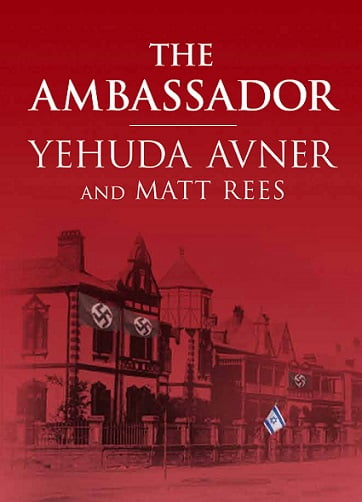Book Review: The Ambassador by Yehuda Avner and Matt Rees
Riveting alternate history novel "The Ambassador" explores a world where Israel's independence takes place 10 years earlier.

Seeing as how the general SATM site doesn’t seem like the right venue for a book review of this nature, I’m publishing it on Buttondown instead.
The Ambassador is a riveting alternative historical fiction novel that imagines a world where Israel declared its independence a decade earlier. What this means is that instead of Britain having authority over immigration, Israel was in charge of who entered the land. Furthermore, it also meant having an ambassador stationed in Berlin, Dan Lavi, as the world was going to hell. Imagine being an Israeli ambassador in Berlin and having to work with the likes of Eichmann, etc.
Ambassador Yehuda Avner brought decades of his own experience to the book, co-authored with Matt Rees. Sadly, Avner would not live to see its publication, having died in late March 2015. The book piqued my interest when I was reading Avner’s Wikipedia after watching The Prime Ministers. To say that this book is a page turner is not an understatement. I spent Thursday evening and a good portion of Shabbos engrossed in the book, not wanting to part with it until I finished. There are three parts to the thriller in addition to the opening prologue and epilogue. Anyway, it has its roots at a Mount Herzl Military Ceremony, where then-PM Shimon Peres apologized to the six million Jews who died by saying, “We were ten years too late.”
As far as world events are concerned, everything that happened between 1937-1942 happens but with a few changes. The Peel Commission proposes partition in 1937, leading to Israeli independence on May 14, 1938. There would still be a War of Independence and it would end with the results being the same—the Old City being under Jordanian control. Of the historical events that did transpire, only the first Cairo Conference was moved up and it comes shortly after the Wannsee Conference. Rather than take place in 1943, they move it to a few months after the US entered the war. Similarly, they moved up the North African campaign to earlier for the same reason. This way, Israeli PM David Ben-Gurion could be in the room with both British PM Winston Churchill and US President Franklin D. Roosevelt. Along with Ambassador Lavi, they brought a key witness with them—captured and taken with them, of course—to try and change the course of the war.
I don’t want to say anything major that would spoil the book for anyone interested in reading it, including when WW2 ends or Hitler kills himself in the alternative history. What I can say is that I really wish this had happened in real life especially since it means more Jews would have had their lives saved. But alas, it’s alternative historical fiction. Both Avner and Rees stay true to the spirit of the real-life characters. Avner worked with Ben-Gurion so he had an idea of how he would respond to situations. As for other characters, some of their dialogue were drawn from the Nuremberg trials or other trials and interrogations. All in all, I highly recommend it for anyone with an interest in historical fiction.